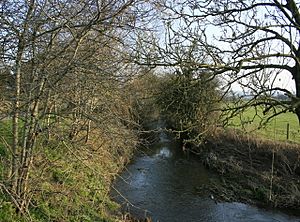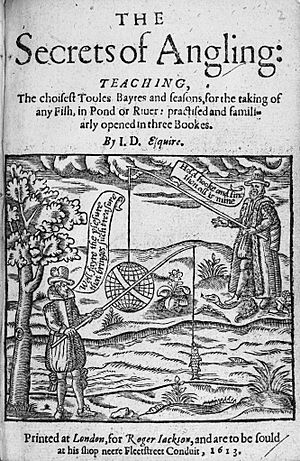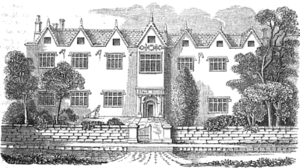John Dennys facts for kids
John Dennys (died 1609) was an English poet and fisherman. He was one of the first writers to create poems about fishing, a style known as Angling poetry. His only book, The Secrets of Angling, was the earliest English poem ever written about fishing. Some people even believe he might have known the famous playwright William Shakespeare.
Contents
Early Life and Family
John Dennys was the son of Hugh Dennis, who lived in a place called Pucklechurch in Gloucestershire. His mother was Katherine Trye. John's family was quite well-known. His grandfather, also named John, was related to Hugh Denys of Osterley, who worked for King Henry VII. John Dennys had an older brother named Henry, but Henry passed away without having any children.
The Secrets of Angling

John Dennys's most famous work is his book of poems called The Secrets of Angling. It was the first book of English poetry ever written about fishing! In his poem, he wrote about a small river called the River Boyd. This river started from streams near his home in Pucklechurch and flowed into the larger River Avon.
He described the River Boyd beautifully:
- And thou, sweet Boyd, that with thy watry sway,
- Dost wash the cliffs of Deignton and of Weeke;
- And through their Rockes with crooked winding way,
- Thy mother Avon runnest soft to seeke;
- In whose fayre streames the speckled Trout doth play.
The book was first published in 1613, after John Dennys had passed away. At first, people didn't know who wrote it, as the author was only listed as "J.D." Many different poets were thought to be the author. But in 1811, records showed that John Dennys was indeed the true writer.
The Secrets of Angling is a long poem with three parts, made up of 151 verses. It teaches readers about fishing in a poetic way, similar to the ancient Roman poet Virgil's Georgics. The book was so popular that it was printed four times by 1652. Copies of these early editions are now very rare and valuable.
Some parts of Dennys's poem were even quoted by other famous writers. For example, Izaak Walton included verses from it in his well-known fishing book, The Compleat Angler, which came out in 1653. A writer named Thomas Westwood even called John Dennys "The Fisherman's Glorious John" because of his important work.
Family Life and Home
John Dennys married a woman named Eleanor Millett. They had several children together:
- Henry (born 1594): He became the High Sheriff of Gloucestershire in 1629. He passed away in 1638 and was buried in Pucklechurch.
- William (born 1596): He was baptized in April 1596 and was also buried in Pucklechurch in 1652.
- Cicely or Cecelia (born 1596): She was baptized on the same day as William. She later married William Guise, who became the Sheriff of Gloucester in 1647.
- Katherine (born 1599): She was baptized in April 1599.
John Dennys was also the lord of the manor (a large estate) at Oldbury-sur-Montem, which was part of Pucklechurch, Gloucestershire. He owned other lands in the area between 1572 and 1608.
Connection to Shakespeare
Some historians believe that John Dennys might have known William Shakespeare. A writer named Rev. Henry Nicholson Ellacombe wrote a book called Shakespeare as an Angler. In it, he suggests that Shakespeare lived for a while in Dursley, which was not far from John Dennys's home at Oldbury-on-Hill. This closeness makes it possible they met.
Death and Legacy
John Dennys passed away on July 30, 1609, and was buried on August 7, 1609, in the old church at Pucklechurch. His family was also buried in the north part of this church. His will, a legal document about his wishes after death, was finalized in October 1609.
Thomas Westwood, the writer who called him "The Fisherman's Glorious John", also wrote a special tribute for John Dennys:
Calm be his sleep in the old aisle of Pucklechurch! or if any sound reach him from the outer world, may it be only the soughing of the sweet south wind, and the ripple of Boyd, that with "crooked winding way" past cliff and meadow, "Its mother Avon runneth soft to seek".
This epitaph shows how much Dennys's love for nature and fishing, especially the River Boyd, was remembered.
Images for kids
 | Mary Eliza Mahoney |
 | Susie King Taylor |
 | Ida Gray |
 | Eliza Ann Grier |






